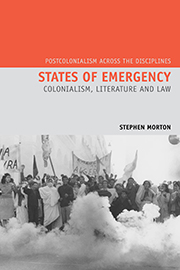Introduction
Summary
Countries are considered to be in a ‘state of emergency’ when executive power is used to suspend the normal rule of law, and power is transferred to the police or military. Emergency legislation is often associated with totalitarian governments or so-called terrorist states, but liberal democracies have also made use of emergency law in times of social and political crisis. A consideration of the etymology of states of emergency can help to clarify the difference between lawful violence, or the violence that is regarded as the exclusive right of governments and states, and lawless violence, or the violence that is deemed illegitimate by governments and states, and often branded as ‘terrorism’ or insurgency. The earliest usage of the word ‘terrorist’ in modern English was attributed to the violent actions of the French revolutionary state in the 1790s, almost fifty years before the term was used to denote an act of terror carried out by an individual (OED). Yet many subsequent definitions of terrorism have tended to overlook state forms of terrorism – thereby implying that the state ‘has a monopoly on the legitimate use of violence’ and the power to define what terrorism means. In one of the more persuasive accounts of the definitional problems associated with the term, Bruce Hoffman has argued that terrorism
is a word with intrinsically negative connotations that is generally applied to one's enemies and opponents, or to those with whom one disagrees and would otherwise prefer to ignore […] the decision to call someone or label some organization ‘terrorist’ becomes almost unavoidably subjective, depending largely on whether one sympathizes with or opposes the person/group/cause concerned.
- Type
- Chapter
- Information
- States of EmergencyColonialism, Literature and Law, pp. 1 - 32Publisher: Liverpool University PressPrint publication year: 2013

